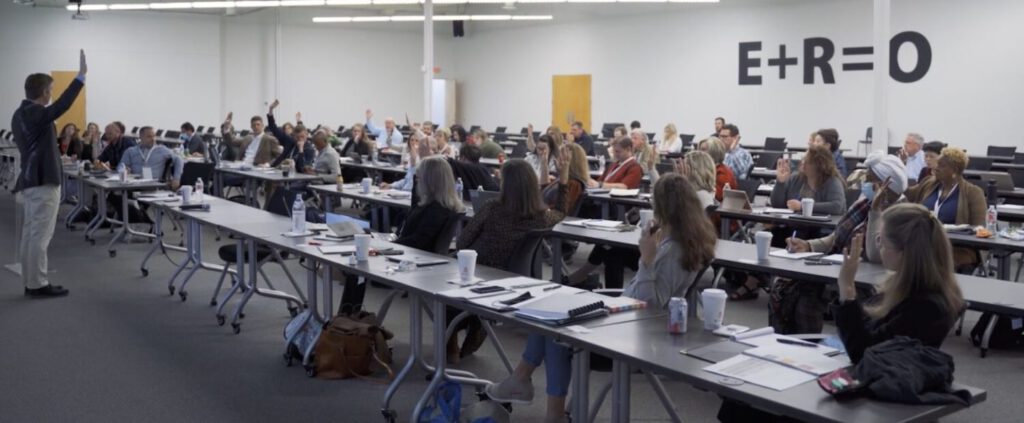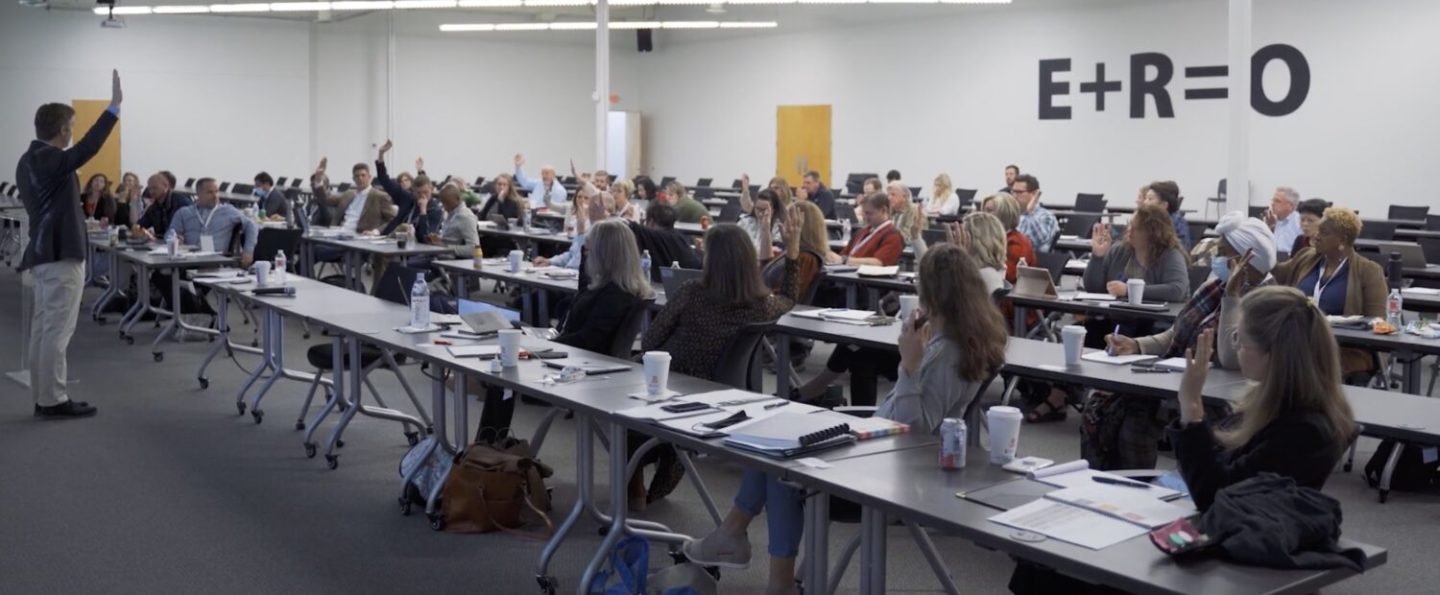From Dependence to Resilience: How Philanthropies Can Better Support Private Schools
This report originally appeared on AEI’s New Conservative Education Agenda.
Private school heads and development directors attend…

This report originally appeared on AEI’s New Conservative Education Agenda.

Private school heads and development directors attend training hosted by the Herzog Foundation in November.
Summary:
- The current popularity of private schools cannot be denied. Alternative schools and educational settings need to prepare for an influx of students.
- Philanthropies are right to help private schools during this period of growth, but they should be helping private school leaders prepare for decades of success.
- Providing donor-development boot camps and school-building tool kits are two ways that philanthropies can more affectively support private schools for long-term success.
Introduction
As the proverb goes, “If you give a man a fish, you feed him for a day. If you teach a man to fish, you feed him for a lifetime.” Philanthropy is not a new concept. In fact, the word “philanthropy” derives from the ancient Greek word philanthropia, meaning “to love people.” True philanthropy and love for others are displayed by helping individuals become more self-sufficient. Yet, too often, philanthropies have created dependent communities and cultures.
More than 1.5 million nonprofit organizations are registered in the United States. In total, these organizations raise hundreds of billions of dollars per year. In 2020, charitable giving reached a record high of $471 billion. Unfortunately, a large percentage of these charitable dollars is not being used in new or creative ways and may be creating dependencies in the recipients they claim to help.
Take food banks for example. The US has more than 200 food banks. In 2020, these organizations distributed six billion meals nationwide. That’s enough food to provide every US resident with breakfast, lunch, and dinner for just over six days. Despite these impressive numbers, hunger persists in the United States.
Foundations should focus on “feeding” private schools for a lifetime—not just a fleeting moment. Private schools have experienced record enrollment growth during the COVID-19 pandemic. Whether you attribute this to public school shutdowns or political pressure on public school curricula, private schools’ current popularity cannot be denied.
Alternative schools and educational settings need to prepare for an influx of students. Otherwise, current enrollment levels will be only a temporary phenomenon. As schools grow, so do their needs. If schools suddenly have more students, then they need more teachers and classrooms. Unless a generous donor or philanthropic organization steps in, schools are often faced with an uncomfortable choice: raise tuition or go out of business.
Philanthropies are right to help private schools during this period of growth. But to fulfill only present needs does a great disservice to these schools. Philanthropies should be helping private school leaders prepare for decades of success. To do this, they must think beyond supporting traditional funding models and start focusing on long-term training and development. For example, The Stanley M. Herzog Foundation has found that providing donor-development boot camps and school-building tool kits are two ways to more effectively support private Christian schools for long-term success.
Donor Development Bootcamps
To offer school leaders and educators programming that teaches them how to create their own scalable and sustainable donor base, the Herzog Foundation hosts donor-development boot camps, where Christian school leaders receive training on donor development, fundraising, and relationship building. And they’re called boot camps for good reason. School leaders spend two 12-hour days not only fostering a better understanding of the concepts and ideas around fundraising but also building a strategic development plan that is unique to their school.
The boot camp begins with sessions focused on reversing what Christian schools think they already know about fundraising and unlocking their true fundraising potential. Then, attendees hear from a panel of individuals with a proven history of making generous philanthropic donations-people otherwise known as “extraordinary givers”-who share what they’re looking for when choosing to donate to certain organizations.
The second half of the boot camp is when attendees really start developing a plan. They craft their mission, vision, and profile. They identify strategic priorities and goals. Most importantly, they give a final presentation to other boot-camp attendees for practice, pretending those attendees are potential donors to their schools.
Yes, foundations could just award checks to each school instead of hosting a grueling boot camp. However, this donation model is not nearly strategic nor scalable enough to create the nation wide impact we desperately need. By providing quality training to educators and leaders nation wide, philanthropies like the Herzog Foundation can reach far more people at a much lower cost than any check ever could.
Zoom out of the Christian education space and you’ll see that this training-focused model can be applied to any industry or philanthropic cause. And it’s the right thing to do-both morally and economically. As conservatives, we must become more strategic and organized with how we spend our philanthropic dollars if we truly want to make a lasting impact.
School-Building Toolkits
Philanthropies have a huge opportunity to encourage entrepreneurship in private education. As Keri Ingraham points out in a recent RealClearEducation piece, America is a world leader in free enterprise but maintains an educational system that resembles those of Communist countries. Entrepreneurs could be the key to breaking the United States’ government-controlled education model. This is why foundations should develop school building tool kits for entrepreneurs, such as the Herzog Foundation’s new SchoolBox program.
Starting a new school can be stressful and daunting. Programs like SchoolBox would alleviate some of that stress by providing resources to groups and individuals interested in starting their own schools. Foundations can bring in key experts to develop these resources, vet the resources through successful school founders and education leaders, and make the resources available online and free to the end users. Imagine how much an influx of brand-new private schools could affect education in America. Increased competition in education helps all schools-both private and pub lic-improve, and philanthropies can play a strategic role in paving the way for such proliferation.
When philanthropies are more strategic about their support, the organizations they assist will be more impactful. When organizations have the tools they need to succeed right at their fingertips, they can act more quickly and effectively. In turn, philanthropies can spread their wealth further when their resources are not tied up with one particular beneficiary or group of beneficiaries.
Many philanthropic organizations’ sole focus is providing charity to the least among us. This is a noble cause, and these organizations should be applauded and supported. However, this is not the only type of philanthropy that can move our society forward.
The education space has a huge opportunity to provide philanthropic support to families that need just a small hand up to achieve the educational dreams they have for their kids. How can philanthropists help middle-class families get ahead? Will helping the “almost able” have a bigger overall impact than solely focusing on the under privileged will? Philanthropists need to grapple with these questions. But one thing is for sure: To have a deeper impact, it’s time to throw conventional wisdom out the window.
All this is not to say there’s not a time and place for traditional monetary donations. Rather, monetary donations cannot be the only contributing factor to an organization’s future success. The future success of K-12 education in America hinges on a combination of financial support, training, and entrepreneurship. Philanthropies must start supplementing their dollars with other resources so that organizations and their leaders have the tools they need to succeed for many years to come.
After all, philanthropy’s success is measured by results, not good intentions.
About the Authors
- Todd Graves is chairman of the Herzog Foundation.
- Darrell Jones is president of the Herzog Foundation.



